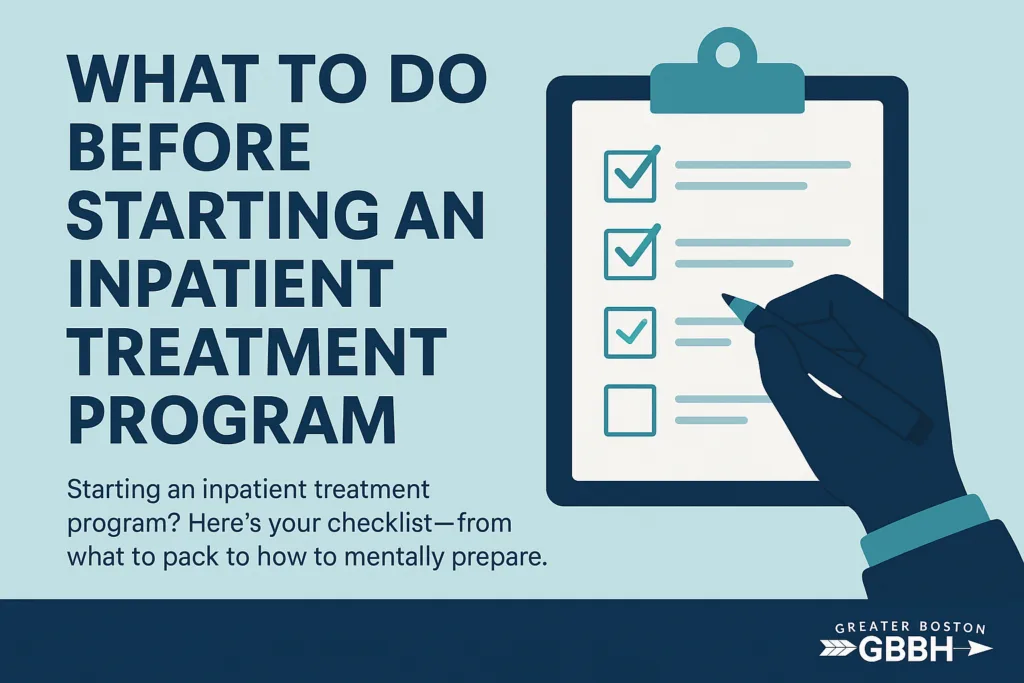Starting an inpatient treatment program isn’t a small decision—it’s a moment of real change. Whether this is your first time considering treatment or you’ve been here before and want something different, we want to say this: it’s okay to feel scared and unsure. The most important thing is that you’re willing.
This blog walks you through how to prepare before entering a residential or inpatient program. It’s not about checking every box—it’s about giving you tools to feel a little more in control, even as you step into something completely new.
1. Understand What an Inpatient Treatment Program Is (and Isn’t)
Inpatient treatment means you’ll be living at the facility full-time, receiving round-the-clock support. It’s not a punishment. It’s not a hospital room with locked doors. At Greater Boston Behavioral Health, it’s a structured, supportive environment where your healing is the priority.
You’ll attend therapy, build community with others in recovery, eat meals prepared for you, and have space to rest. Some days will feel hard. Some days might feel quiet. All of them are steps toward rebuilding a life that feels manageable—and eventually, meaningful.
2. What to Pack for Inpatient Treatment
Packing can feel overwhelming, especially when you’re already carrying a lot emotionally. Here’s a simple list of what to bring—and what to leave behind.
✅ What to Bring:
- Comfortable, weather-appropriate clothing (1-2 weeks’ worth)
- Sneakers, sandals, or slippers
- Pajamas, robe, and undergarments
- Toiletries (unopened, alcohol-free if possible)
- Prescription medications (in original packaging)
- Photo ID and insurance card
- A journal or notebook
- One or two personal comfort items (like a photo or favorite book)
What Not to Bring:
- Substances or drug paraphernalia
- Clothing with drug, alcohol, or violent graphics
- Valuables or large sums of cash
- Electronic devices (check with admissions for specifics)
- Any aerosol or flammable items
3. Take Care of Responsibilities at Home (As Much as You Can)
This step isn’t about perfection—it’s about peace of mind. Taking a few small actions before you leave can help reduce anxiety about what’s waiting when you return.
Consider:
- Notifying your employer (you’re entitled to medical leave—no need to explain details)
- Arranging pet care or asking someone to water your plants
- Setting up autopay for bills or rent
- Letting a trusted friend or family member know you’ll be in treatment
- Creating a list of emergency contacts or medications for easy reference
It’s okay if you can’t handle all of this. We’ve had many clients come in with unfinished lists—and they still got better.
4. Prepare Emotionally for the First Few Days
This might be one of the hardest parts. You might feel like you’re walking into the unknown—or walking away from what’s familiar, even if it’s been painful.
Expect to feel uncomfortable at first. Many people do. But also expect to be supported every step of the way. Here’s what can help:
- Give yourself permission to feel anxious, angry, numb, or scared. Those feelings are part of it.
- Remember: You’re not signing up for perfection. You’re showing up for care.
- Picture one small thing you’re hoping to feel again—calm, clarity, connection.
5. Set a Simple Intention
You don’t need a full recovery plan on day one. But setting a small, personal intention can help ground you:
“I want to feel safe.”
“I want to remember who I am without substances.”
“I want to stop hiding.”
Write it down. Keep it with you. Let it be your anchor when things feel shaky.
6. Talk to Someone Before You Go (If You Can)
Whether it’s a parent, friend, partner, or someone from our admissions team—saying out loud that you’re getting help is a powerful thing. It can shift the story from “I’m a mess” to “I’m making a move.”
You don’t need a perfect speech. You don’t even need them to understand. Just speak your truth:
“I’m starting treatment. I don’t know what to expect, but I’m doing this for me.”
And if you’re not ready to talk to anyone in your life, call us. We’ll hold space for your fears, not rush your process.
7. Say Goodbye—Without “One Last Time”
A common temptation is to use “one last time” before entering treatment. It can feel like a send-off. But the truth is, it’s not a celebration—it’s often a deepening of the pain you’re trying to climb out of.
You don’t need to go out with a bang. You’re not closing the door on who you are—just on what’s been hurting you.
If that “one last time” voice creeps in, try this instead: write down what you want to leave behind—and what you want to walk toward.
FAQ: Preparing for an Inpatient Treatment Program
What if I change my mind before I arrive?
That’s okay. Fear is normal. You can talk it through with our admissions team. We’re not here to pressure—we’re here to support. The door stays open.
Can I talk to my family or partner during treatment?
Yes. Once you’re admitted, we’ll help coordinate communication. Many clients have structured call times or family sessions as part of care.
Do I have to detox before I come?
Not always. Some people begin treatment after detoxing at a separate facility, others detox as part of their inpatient stay. We’ll help assess what’s safest for you during intake.
Will I have a roommate?
Often, yes. Many treatment centers use shared rooms to encourage connection and reduce isolation. We do our best to match roommates respectfully.
How long will I stay?
It varies. Some programs are 30 days, others longer. You’ll work with a clinical team to build a plan that makes sense for your needs and recovery goals.
We’re Ready When You Are
You don’t have to be completely ready to start—just ready enough to reach out. Whether you’re still packing, still scared, or still wondering if this will work, you’re not alone.
Greater Boston Behavioral Health is here to offer real help, not false promises. We meet you where you are—with structure, compassion, and care that lasts.
Ready to Take the First Step?
Call us at (888) 301-8072. You’ll talk to someone who gets it—and who can help you take the next step toward care, safety, and real recovery.


